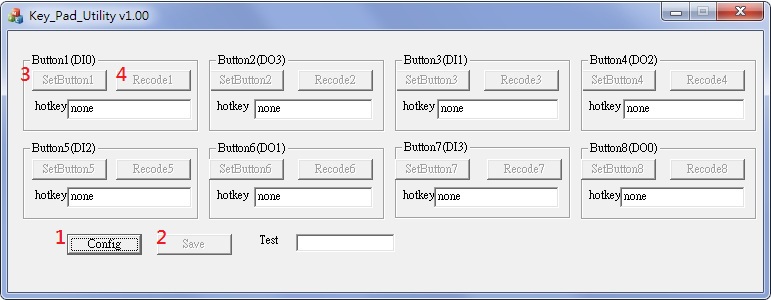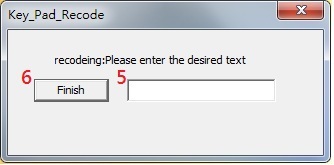請先看『使用說明』
Key Pad Utility Windows
From LEXWiKi
Contents |
The Sample code source you can download from
<FTP>
Source file:Key_Pad_utility_Src_v1.1_x86Key_Pad_utility_Src_v1.1_x64
Binary file:Key_Pad_utility_Bin_v1.1_x86Key_Pad_utility_Bin_v1.1_x64
How to Use The Utility
- 1.config
- start set button or cecode
- 2.save
- save button
- 3.setbutton
- Settings button analog keyboard
- 4.recode
- open new window to recode
- 5.Enter
- the text you want to enter
- 6.finish
- Complete text input
Introduction
Initial Internal F75111 port address (0x9c)
define GPIO1X, GPIO2X, GPIO3X to input or output and Enable WDT function pin
Set F75111 DI/DO ( sample code as below Get Input value/Set output value )
DI: InterDigitalInput()
PULSE mode
Sample to setting GP33, 32, 31, 30 output 1mS low pulse signal.
{
this->Write_Byte(F75111_INTERNAL_ADDR, GPIO3X_PULSE_CONTROL, 0x00); //This is setting low pulse output
this->Write_Byte(F75111_INTERNAL_ADDR, GPIO3X_PULSE_WIDTH_CONTROL, 0x01); //This selects the pulse width to 1mS
this->Write_Byte(F75111_INTERNAL_ADDR, GPIO3X_CONTROL_MODE, 0x0F); //This is setting the GP33, 32, 31, 30 to output function.
this->Write_Byte(F75111_INTERNAL_ADDR, GPIO3X_Output_Data , 0x0F); //This is setting the GP33, 32, 31, 30 output data.
}
Initial internal F75111
void CKey_Pad_utilityDlg::InitInternalF75111()
{
::Write_Byte(F75111_INTERNAL_ADDR,GPIO1X_CONTROL_MODE ,0x00); //set GPIO1X to Input function
::Write_Byte(F75111_INTERNAL_ADDR,GPIO3X_CONTROL_MODE ,0x00); //set GPIO3X to Input function
::Write_Byte(F75111_INTERNAL_ADDR,GPIO2X_CONTROL_MODE ,0x00); //set GPIO2X to Input function
}
Get Digital Input
BYTE F75111_GetDigital0 ()
{
BYTE byteGPIO1X = 0;
BYTE byteGPIO2X = 0;
BYTE byteGPIO3X = 0;
BYTE byteData = 0;
::SMBus_ReadByte(m_F75111.bAddress,GPIO1X_INPUT_DATA,&byteGPIO1X) ;
::SMBus_ReadByte(m_F75111.bAddress,GPIO2X_INPUT_DATA,&byteGPIO2X) ;
::SMBus_ReadByte(m_F75111.bAddress,GPIO3X_INPUT_DATA,&byteGPIO3X) ;
byteGPIO1X = ~byteGPIO1X & 0xF0;
byteGPIO3X = ~byteGPIO3X & 0x0F;
byteGPIO2X = ~byteGPIO2X & 0xFF;
byteData = ( byteGPIO1X & 0x10 )? byteData + 0x01 : byteData ;
byteData = ( byteGPIO2X & 0x80 )? byteData + 0x02 : byteData ;
byteData = ( byteGPIO1X & 0x80 )? byteData + 0x04 : byteData ;
byteData = ( byteGPIO2X & 0x04 )? byteData + 0x08 : byteData ;
byteData = ( byteGPIO1X & 0x40 )? byteData + 0x10 : byteData ;
byteData = ( byteGPIO2X & 0x02 )? byteData + 0x20 : byteData ;
byteData = ( byteGPIO3X & 0x01 )? byteData + 0x40 : byteData ;
byteData = ( byteGPIO2X & 0x01 )? byteData + 0x80 : byteData ;
return byteData;
}
RunGetKeyThread
UINT RunGetKeyThread(LPVOID lParam)
{
char StrTemp[3][16];
int i,j,k,wParamtemp,lParamtemp;
int StrSize=16,finish=0;
CEdit *edittemp;
CKey_Pad_utilityDlg *dlg=(CKey_Pad_utilityDlg *)lParam;
start=1;
switch (setbutton)
{
case 1:
buttontemp = &button1;
edittemp= &dlg->m_edit_recode1;
break;
case 2:
buttontemp = &button2;
edittemp= &dlg->m_edit_recode2;
break;
case 3:
buttontemp = &button3;
edittemp= &dlg->m_edit_recode3;
break;
case 4:
buttontemp = &button4;
edittemp= &dlg->m_edit_recode4;
break;
case 5:
buttontemp = &button5;
edittemp= &dlg->m_edit_recode5;
break;
case 6:
buttontemp = &button6;
edittemp= &dlg->m_edit_recode6;
break;
case 7:
buttontemp = &button7;
edittemp= &dlg->m_edit_recode7;
break;
case 8:
buttontemp = &button8;
edittemp= &dlg->m_edit_recode8;
break;
}
while(start==1 )
{
if(KeyDownFlag==1)
{
wParamtemp=msgtemp1->wParam,lParamtemp=msgtemp1->lParam;
while(1)
{
for( i=1;i<156;i++)
{
for( j=1;j<156;j++)
{
for( k=1;k<156;k++)
{
if(i!=j && i!=k && j!=k )
{
if( wParamtemp==i && cbuf[j]&0x80 && msgtemp1->wParam==k && (msgtemp1->message == WM_KEYDOWN || msgtemp1->message == WM_SYSKEYDOWN) )
{
buttontemp->hotkey1.wParam = i;
buttontemp->hotkey2.wParam = j;
buttontemp->hotkey3.wParam = k;
GetKeyNameText(MapVirtualKey(buttontemp->hotkey1.wParam,0) << 16,StrTemp[0],StrSize);
GetKeyNameText(MapVirtualKey(buttontemp->hotkey2.wParam,0) << 16,StrTemp[1],StrSize);
GetKeyNameText(MapVirtualKey(buttontemp->hotkey3.wParam,0) << 16,StrTemp[2],StrSize);
strcat(StrTemp[0],"+");
strcat(StrTemp[0],StrTemp[1]);
strcat(StrTemp[0],"+");
strcat(StrTemp[0],StrTemp[2]);
edittemp->SetWindowTextA(StrTemp[0]);
KeyDownFlag=0;
start=0;
memset(cbuf,0,sizeof(cbuf));
return TRUE;
}
if( (cbuf[i]&0x80)==0x80 && (msgtemp1->wParam==j) && (msgtemp1->message == WM_KEYUP || msgtemp1->message == WM_SYSKEYUP) )
{
buttontemp->hotkey1.wParam = i;
buttontemp->hotkey2.wParam = j;
buttontemp->hotkey3.wParam = 0;
GetKeyNameText(MapVirtualKey(buttontemp->hotkey1.wParam,0) << 16,StrTemp[0],StrSize);
GetKeyNameText(MapVirtualKey(buttontemp->hotkey2.wParam,0) << 16,StrTemp[1],StrSize);
strcat(StrTemp[0],"+");
strcat(StrTemp[0],StrTemp[1]);
edittemp->SetWindowTextA(StrTemp[0]);
KeyDownFlag=0;
start=0;
memset(cbuf,0,sizeof(cbuf));
return TRUE;
}
if( wParamtemp==msgtemp1->wParam && (msgtemp1->message == WM_KEYUP || msgtemp1->message == WM_SYSKEYUP) )
{
buttontemp->hotkey1.wParam = msgtemp1->wParam ;
buttontemp->hotkey2.wParam = 0;
buttontemp->hotkey3.wParam = 0;
int y=GetOEMCP();
int x=MapVirtualKey(buttontemp->hotkey1.wParam,0) ;
GetKeyNameText(MapVirtualKey(buttontemp->hotkey1.wParam,0) << 16,StrTemp[0],StrSize);
edittemp->SetWindowTextA(StrTemp[0]);
KeyDownFlag=0;
start=0;
memset(cbuf,0,sizeof(cbuf));
return TRUE;
}
}
}
}
}
}
}
}
return 0;
}
RunDIOThread
UINT RunDIOThread(LPVOID lParam)
{
F75111_Init();
CKey_Pad_utilityDlg *dlg=(CKey_Pad_utilityDlg *)lParam;
while(1)
{
char *temp=0;
BYTE intputsignal=0;
intputsignal=F75111_GetDigital0();
while(1)
if(intputsignal!=F75111_GetDigital0())
break;
switch(intputsignal)
{
case 0x01:
{
dlg->execute(button1);
break;
}
case 0x02:
{
dlg->execute(button2);
break;
}
case 0x04:
{
dlg->execute(button3);
break;
}
case 0x08:
{
dlg->execute(button4);
break;
}
case 0x10:
{
dlg->execute(button5);
break;
}
case 0x20:
{
dlg->execute(button6);
break;
}
case 0x40:
{
dlg->execute(button7);
break;
}
case 0x80:
{
dlg->execute(button8);
break;
}
}
}
return 0;
}


